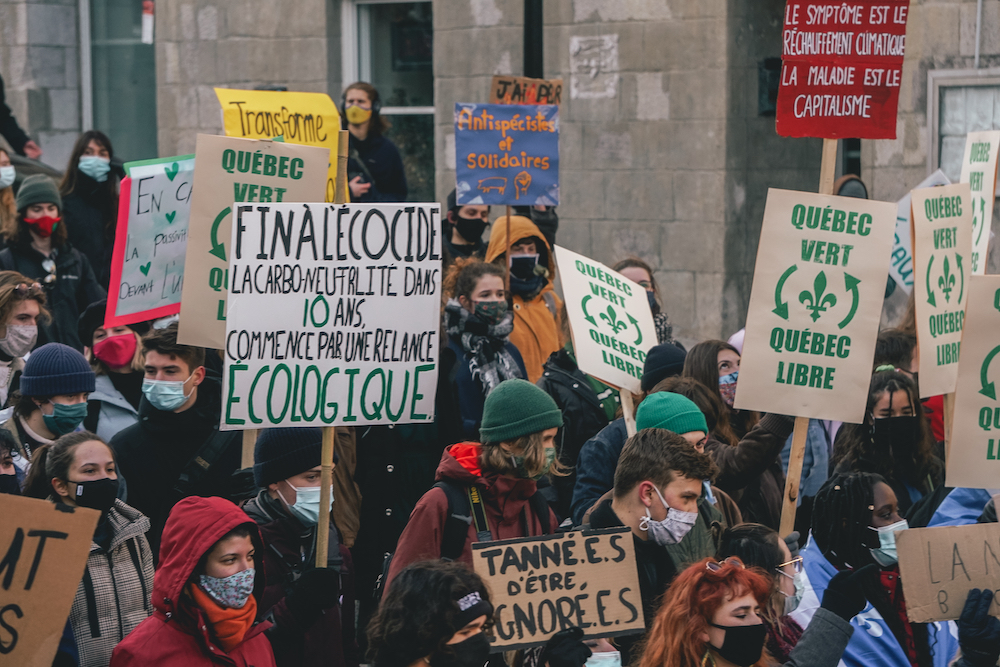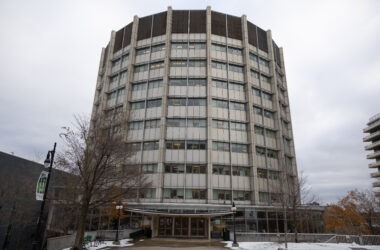On March 19, the Coalition étudiant pour un virage environnemental et social (CEVES) organized “Manifestation mondiale pour la justice climatique et sociale” (Global protest for climate and social justice). The march was part of Greta Thunberg’s Fridays for Future movement, which unites climate protesters worldwide each Friday to demand government action to achieve carbon neutrality by 2030, and the recognition of Indigenous sovereignty over unceded lands. CEVES, a Quebec student organization, seeks to achieve racial, climate, and immigration justice in Montreal and worldwide.
The march, which saw over 300 people participate, began with a rally in Jean-Mance Park. Attendees gathered to demand carbon neutrality by 2030, the recognition of Indigenous sovereignty in Canada, and the defunding and demilitarization of police forces.
Activist Janet Pilot from The Racial Justice Collective, a community organization that aims to create a better future for BIPOC youth, spoke about her work with students. Pilot emphasized the need to work collectively as a community to achieve climate and racial justice for the generations to come. She stressed that both the government and individuals have a role in combating systemic racism against Indigenous communities across Canada.
“We want to help our children in the right direction for our next generation,” Pilot said.* “We know that all of the systems are strong. Our government will not address these concerns, especially in the area of the health of our government [….] So, to send our children in the right direction for the next generation, it will take the help of everyone.”
The event focussed on climate and social justice, highlighting the voices of local activists—joined by socialists, communists, and nationalists alike—and their unique perspectives on the necessity for policy changes addressing the climate crisis. Nathalia Garcia, BA ’18, attended the march with Socialist Fightback at Concordia and McGill, an organization that aims to change the current cycles of economic production to pave the way for a sustainable future. Garcia urged that there was a distinct connection between climate change and capitalism.
“We are here to connect the struggle against climate change with the struggle against capitalism,” Garcia said. “I think that there’s a really clear link between everything that is going on with the environment and the way that we produce things. The people who make the decisions about production don’t really care about the environment, oil spills, green energy, or anything about the environment [….] Let’s put production in the hands of people who actually care about the environment and the people who actually feel the effects of the environmental collapse.”
According to Garcia, marches and mass politics play an important role in the fight for climate justice; change will only transpire from a collective force.
“I think protesting and mass action is very important, but it can’t just be random actions here and there,” Garcia said. “There has to be coordination. The labour movement has to get involved as well.”
Hady Anne spoke on behalf of Solidarity Across Borders, a Montreal-based migrant justice network. Anne described his organization’s goals regarding the intersectional fight for migrant and climate justice.
“We demand a strategy for all because we have a duty to act regarding the issues of environment, extraction, forest deterioration, the confiscation of Indigenous lands, but also of migration,” Anne said.*
Anne emphasized the critical link between the environmentally unsustainable policies of developed nations and the influx of migrants as a result of unstable living conditions in their home countries.
“They leave their countries because of the theft,” Anne said. “They leave their countries because there is this capitalism which extracts resources from their countries, which creates wars, and which displaces their people.”
*Note: The quotes from Hady Anne and Janet Pilot have been translated from French by the author.







